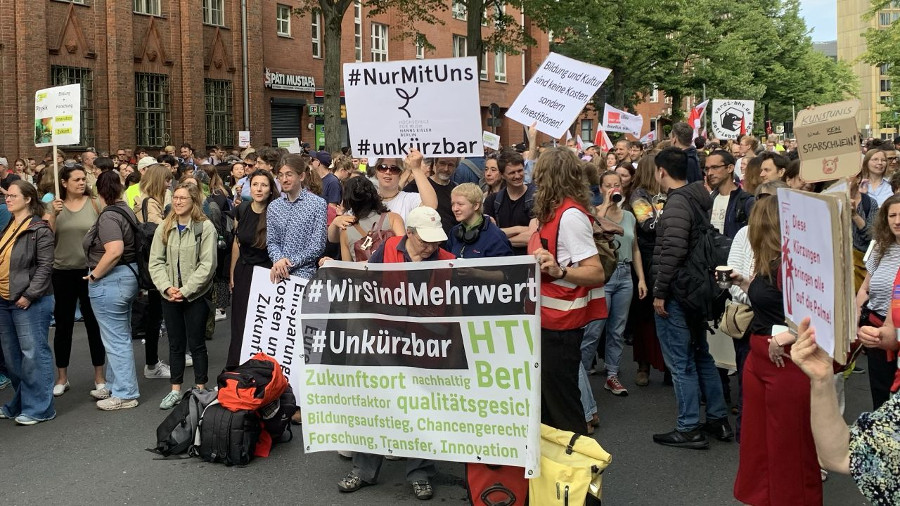|
Attack on the welfare state: "This is morally bankrupt" It is a policy that destroys people instead of supporting them. Too few people ask the crucial question: Why do people even have to apply for basic income support? The problem isn't individual failings, but political decisions. Precarious wages, insecure jobs, expensive rents, and an unequal education system create poverty and keep people trapped in it. A society that truly values social security would ensure living wages, a fair tax system, and robust public services. Instead, we are once again witnessing how the most vulnerable are punished as a show of force. This is not only socially misguided, it is also morally bankrupt. Eva Völpel: As a social worker in the Ruhr area, you experienced firsthand what poverty means. What consequences will the reform have for people who depend on the so-called new basic income support? Cansın Köktürk: The Federal Constitutional Court has unequivocally ruled that the state may not deprive anyone of their subsistence minimum. Never, under any circumstances! The right to a dignified minimum standard of living is non-negotiable; it is enshrined in the Basic Law. And yet the government is now tightening the sanctions for basic income support. Why? Because it's bowing to pressure from the right. Because it believes it can score points by cracking down on the poor , instead of finally and seriously combating poverty. Cutting benefits for people who barely have enough to live on is humiliation instead of support, and it's pursuing its own agenda: class warfare from above. The new basic income support isn't about "incentives," as the government likes to claim; it's about distrust, control, and punishment. It's criminalizing the unemployed instead of giving them fair opportunities. The coalition has to decide: Is it on the side of the people or on the side of contempt? We in The Left Party will not allow the fundamental right to human dignity to be sacrificed for the sake of populist symbolic politics . Eva Völpel: How do you explain the fact that the attacks against people who depend on the welfare state are increasingly finding such fertile ground? Cansın Köktürk: For decades, politicians, business lobbies, and some media outlets have been telling us the same fairy tale: that poverty is self-inflicted, that people need "more incentives" to work, and that social benefits are a "burden." This neoliberal narrative has become deeply ingrained. It distracts from the true causes and effects of social inequality, such as low wages, housing shortages, wealth concentration, and tax evasion by the very wealthy. When crises like inflation, high energy costs, and job insecurity are added to the mix, the resulting anger isn't directed upwards at the profiteers, but downwards, at those who have the least. This is a deliberate political strategy. Pitting the poor against each other protects the rich from criticism. Eva Völpel: For weeks, the CDU/CSU alliance, flanked by employers, has been attacking the welfare state. Sometimes they propose abolishing the first level of care dependency or restricting sick pay; other times, Chancellor Merz criticizes rising expenditures in youth and integration assistance programs. There are also massive attacks on statutory health insurance. According to the influential CDU Economic Council, we will soon have to pay for dental and orthodontic treatments ourselves or take out private insurance. This would mean higher costs for many, coupled with lower quality of care. What political and economic agenda are Merz and his allies pursuing with a view to the bigger picture? Cansın Köktürk: When Merz proposes abolishing care level 1, cutting sick pay, or privatizing health insurance benefits, he is pursuing a clear agenda. The wealthy are to be relieved of the burden, while employees, pensioners, those requiring care, and the sick are to pay. This is the old neoliberal playbook, and Merz is its most loyal disciple. The CDU/CSU and its allies in employers' associations dream of a country where social security once again becomes a privilege for those who can afford it. The rest are expected to "make an effort," "provide for their future," and "take personal responsibility." This means every man for himself, instead of working together for the better for everyone. Meanwhile, public funds continue to be pumped into armaments, corporate subsidies, and tax breaks for the wealthy. This amounts to cutting back on the welfare state and redistributing wealth from the bottom to the top. The welfare state and solidarity are not cost factors, but rather the foundation of democracy and social peace. And we all want and need a good, a better welfare state in our lives. If Merz and his ilk want to dismantle it, it's not out of economic necessity, but out of political calculation. They want to secure power by protecting the wealthy and serving their interests, thereby weakening social cohesion. Our alternative is justice, solidarity, and a welfare state that belongs to everyone, not just those who can buy it. Eva Völpel: The German government has appointed a commission tasked with developing proposals for a "modern and less bureaucratic welfare state." The focus is on basic income, housing benefit, and child supplement. Benefits may be consolidated, and processes streamlined. What is your assessment of the commission's mandate and composition? Cansın Köktürk: On paper, it sounds good at first. Less bureaucracy, more transparency, simpler procedures. But when you look at who sits on the commission, it quickly becomes clear where this is really headed. Ministerial officials among themselves, hardly any room for social organizations, no voices from the field, no those affected, no poverty researchers. This is primarily self-governance by the bureaucracy. A welfare state doesn't become more humane when it's technocratically "optimized" from above. A modern welfare state means putting people at the center, not files. But that's precisely what's in danger of being lost. Instead of talking about real improvements like higher benefit rates, subsistence-level benefits, the abolition of sanctions, and easier access to assistance, the focus is once again on tinkering with existing structures, as if poverty were merely an administrative problem. Eva Völpel:Back to the commission: Reducing bureaucracy can be beneficial if it makes it easier for people to apply for benefits. However, this often increases the number of people applying for benefits and drives up costs. It's hard to imagine that the federal government intends this. What have you heard about how clearly the commission was given budget cuts? What information is actually being shared about their work? Cansın Köktürk: There can be no talk of transparency with this commission because it's all backroom deals. A modern welfare state isn't measured by the billions saved, but by the number of people who can finally live without fear. If cutting red tape becomes a pretext for cuts, then that's not progress, but social regression. Eva Völpel: The statutory pension system is also under attack. Federal Economics Minister Reiche demands that we all work longer, while Merz says that people need to be asked to do more. According to the coalition agreement, the government intends to examine a "new benchmark for the overall level of benefits across all three pension pillars" by the middle of its term. This means that the government plans to reassess the benefit levels of the three pillars—the general statutory pension scheme, occupational pensions, and private retirement savings—in relation to one another. This will likely result in a further reduction of the benefit level in the statutory pension system and a strengthening of the market for private pension products. Cansın Köktürk: Old-age security is not a matter of speculation, but a human right. The statutory pension must once again become the backbone of old-age security – strong, reliable, and based on solidarity. Let me be perfectly clear: anyone who sees pensioners collecting returnable bottles and then demands that people work even longer has completely lost touch with reality. We need a statutory pension that protects against poverty. Eva Völpel: Recently, a group of young CDU/CSU MPs questioned the already negotiated pension compromise between the CDU/CSU and SPD, which aims to guarantee the pension level at least at 48 percent until 2031. How do you interpret this? Have Merz and General Secretary Spahn lost control of the situation? What does this mean for the centrifugal forces and the rightward shift within the CDU/CSU? Or is this a coordinated good-cop/bad-cop game to put increasing pressure on the SPD? Cansın Köktürk: This isn't a dispute over details, but part of a larger project: the gradual dismantling of the welfare state and the replacement of social security with personal responsibility. The fact that the negotiated pension compromise is now being questioned primarily demonstrates the CDU/CSU's disunity and internal strife. At the same time, right-wing factions within the CDU/CSU are putting pressure on the SPD and the public. The goal is clear: to permanently lower pension levels and attack the most vulnerable. This CDU/CSU is socially blind and blindly obsessed with the market, whether in pensions, healthcare, or education. Right-wing rhetoric, fantasies of cuts, and myths of personal responsibility are its trademarks. And with this, it ultimately strengthens the AfD and far-right visions of society. Eva Völpel: Speaking of the SPD: What advice would you give the party regarding the welfare state debate? Cansın Köktürk: It's about taking a stand again, taking social security seriously, and representing the interests of the majority, not those of the markets or one's own coalition partners. Anyone who forgets this will jeopardize their political base in the long run. The Social Democrats' election results speak volumes. It's not enough to talk about social policy while Merz, Reiche, and their ilk try to dismantle the welfare state every day. The SPD must draw clear red lines to regain credibility, for example, regarding pension levels, basic income, and long-term care. It must not adopt the rhetoric of the Christian Democrats. Anyone who starts repeating essentially the same arguments for cuts in certain variations loses the trust of people who depend on the welfare state, loses as a party, and fuels the shift to the right. Eva Völpel: When there are massive attacks on the welfare state, the social left is often preoccupied with defensive battles. Is that enough? Cansın Köktürk: No, defensive battles are not enough. Of course, we must defend ourselves against attacks on basic income, pensions, long-term care, and healthcare. But social policy cannot simply react. We need a proactive left-wing agenda that strengthens social security, prevents poverty, combats social inequality, and addresses the question of distribution. It's about shaping the societal debate, not just reacting to austerity measures. Those who only defend cede the power of interpretation to those who want to dismantle the welfare state. We have the answers, we have the proposals, we have sound solutions. What we need now is more exchange among people fighting for a different welfare state, more pressure on the streets, more creativity, and more solidarity in our struggles against this merciless policy. As a social worker with practical experience, I know exactly what's missing and what's possible, and it's all financially feasible. One problem, however, is that many people gasp when they hear this, because all they can do is wonder how it's supposed to be paid for. The neoliberal mantra limits our imagination of what a different world could be. We need good answers to that. We also need to take a closer look at wealth taxes and wealth inequality in Germany and calculate what we could finance over the years for social security, care, education, and a poverty-proof pension. This isn't wishful thinking; it's a question of political priorities and justice. Eva Völpel: So what is important now? Cansın Köktürk: It is now crucial that we, on the one hand, fight against social cutbacks, rising rents, and unfair wages, and on the other hand, advance our vision of a just welfare state and demonstrate that social justice and tangible changes in people's everyday lives are achievable. We must show what is possible and present concrete alternatives. We do this, for example, by advocating for a sanction-free, poverty-proof basic income, social housing, stronger collective bargaining agreements, a higher minimum wage, and investments in education and healthcare. Our goal is social security for all and a society in which no one falls through the cracks. Eva Völpel: You left the Green Party in 2023, partly because of the party's stance on European asylum policy. Now you're a member of the Bundestag for The Left Party. What is your greatest hope for the party, and what is its biggest challenge? Cansın Köktürk: My greatest hope is that we can convince even more people. I believe we're on the right track. We're showing that politics can't be detached from reality, that we need to address people's real problems and not just discuss them in the government district. The biggest challenge is reaching people who perceive our demands as radical. But standing up for humanity and human dignity, or for one's own better social security, isn't radical. What is radical is ignoring people's lived realities. At a time when a far-right party is gaining ground, we also need to make it clear: The AfD doesn't make policy for the majority, but for the wealthiest, and sells it on that to push through its racist agenda. We must raise our voices together against fascism. And we will! https://www.rosalux.de/news/id/53957/attacke-auf-sozialstaat-das-ist-moralisch-verroht Back Cansın Köktürk has been a member of the Bundestag for The Left Party since 2025 and is their spokesperson for social policy. She studied social work and worked for several years as a social worker in Bochum. In 2023, her book "Unsozialstaat Deutschland. Warum wir radikal humanistisch werden müssen" (Germany as an Unsocial State: Why We Must Become Radically Humanistic) was published. Köktürk left the Green Party in 2023 because she could not support the party's asylum policy at the European level or the eviction of the hamlet of Lützerath (protests against the local lignite mining). |
|
||||||
|
|||||||




